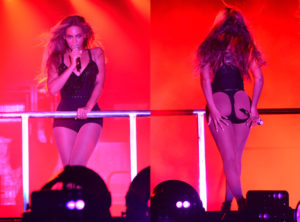
As the new mother and curvaceous beauty posts picture after picture of herself in bikinis that hardly meet the requirements to even be called bathing suits, many have been stroking their chins, digging deep in thought and think piecing away to launch a serious debate: Is the famous celebrity ex embracing her sexuality through an act of empowerment, or has she crossed the line into sexually exploiting herself—thus feeding into the negative stereotypes that already exist about women in media?
It’s certainly not a new discussion.
When Beyonce donned some revealing ensembles of her own during the Mrs. Carter Show World Tour, she took a stance that these outfits were a part of her own brand of feminism. The international singing sensation released an entire album with sexual imagery and explicit lyrics that some felt pushed the boundaries of what could truly be considered an act of feminism.
But if that’s the case, where do young women draw the line?
According to Aurelia Belfield, one of the women behind the Black Girls Talking podcast, it’s all about the personal intentions of the women involved.
Belfield made it clear that she had no problem with Rose’s risqué images because she certainly seemed to be in charge of the photos.
Belfield argues that it’s that sense of control that can truly serve to be a defining factor in many cases.
“I think it’s definitely a lot more complicated than a lot of think pieces out there are trying to make it,” Belfield told Atlanta Blackstar. “I think you see people like Amber Rose and other adult women like Beyonce or Nicki Minaj or whoever out there sort of making it known that they are taking charge of their sexuality and they’re presenting themselves and their sexuality in a very specific way that shows that they have agency in the situation. “
Even then Belfield says having control of the situation isn’t the only thing to consider.
She said the women’s motives behind taking the photos are just as important as their control over the images.
It’s the question of whether these women are taking the pictures simply because they want to or is it an attempt to garner attention from the opposite sex or “any person outside of themselves.”
“You have to look at each situation individually,” Belfield said. “I think a lot of young girls…that are out there taking these salacious photos on Instagram, you have to look at each of their situations. Are they doing it to get attention from boys or girls or whoever? Are they viewing it as a form of self-celebration or are they viewing it as a form of self-harm that may be stemming from some kind of trauma, be it physical or mental.”
Not everybody agrees that the sexual images are empowering, however.
In fact, one female college student at the University of Nebraska-Lincoln considers the hypersexualization of women, whether by men or by women themselves, to be a huge contradiction and a hindrance to the feminist mission.
Tegan Colton referred to a study led by psychologist Susan Fiske of Princeton that found that when men viewed images of women’s sexualized bodies, they viewed the women as objects rather than as people, regardless of the women’s agency over the photos.
Researchers said there were no indications that men considered any person’s intentions or conscious decisions when portraying themselves in a sexualized manner.
For that reason, she found the idea of “empowering” women through salacious photos to be a major contradiction.
“There’s little to no evidence supporting the notion that women choosing to hyper-sexualize themselves is liberating or even different from present cultural attitudes,” Colton wrote in the Daily Nebraska. “In fact, it’s far better argued that it only further tightens the age-old sexist chains that have ruled our gender relations for centuries. If women were considered to be mere extensions of their sexuality for centuries, gaining ‘empowerment’ from objectifying themselves is like returning to prison after captivity and calling it ‘freedom.’”

“Women will be liberated when they’re free to be powerful without being objectified at all,” she added.
As the discussion rages on, Belfield says we also have to be cautious about how we discuss women’s decisions to push the boundaries with their sexuality in the media.
She said there is an entire mental process behind these images and that this new wave of feminism can’t be discussed like a “fashion trend.”
“A lot of people fail to see the nuance in the situation,” she explained. “So instead of treating it like a fashion trend, like it’s this large wave that everybody’s doing, start looking at these people—if there is somebody specific that you’re concerned about, ask them about it. Treat them like the adult that they want to be treated as.”
Without having that conversation with these women, Belfield says, it will be nearly impossible to truly understand their thought process and really decode the messages they are hoping to send through their own risqué photos.


